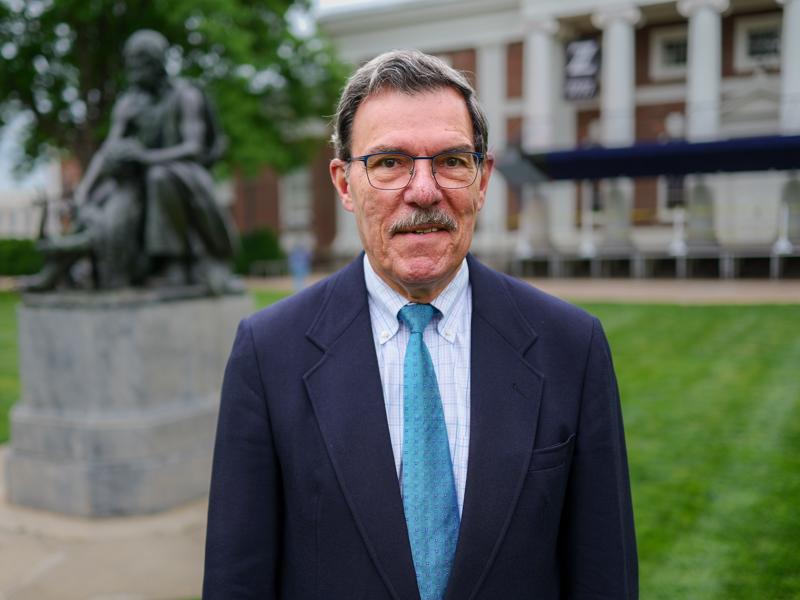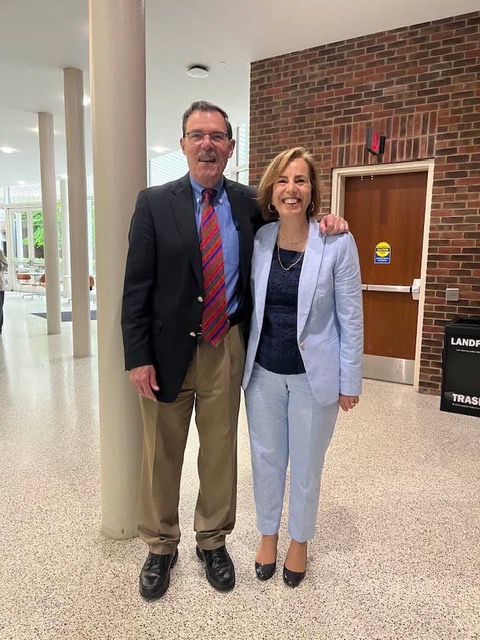An Epic Career for UVA Classics Professor

Climbing up the stairs from his office on the lower level of Cocke Hall and exiting on to the Lawn, Professor John F. Miller could walk a few paces to his right and make out the Greek inscription on Old Cabell Hall from the Gospel of John translating to, “And ye shall know the truth, and the truth shall make you free.”
Miller whimsically wonders whether Thomas Jefferson, who intended for the university he founded to be a secular institution that separated religious instruction from education, would have been horrified at the inclusion of a Biblical passage atop one of the University of Virginia’s academic buildings. At the same time, the longtime Arthur F. and Marian W. Stocker Professor of Classics, retiring this summer after a distinguished 40-year career at UVA, finds it reassuring to see such a fitting passage for the educational mission of a liberal arts education etched in stone, in ancient Greek no less.
“Some might also look at the statue of Homer on the Lawn in the same way as they do Classics, as a quaint remnant of the past. But classics can be a focal point for what we are about as a university, and a country,” Miller says. “That inscription is not just an enduring symbol of what Jefferson imagined the classics could be, as one of this University’s original 10 divisions, but also of how classics can still be a focal point for discussing emerging issues of the day.”
An internationally renowned scholar and admired teacher, Miller is credited with helping to build a once small academic department in the College and Graduate School of Arts & Sciences, bringing it into national prominence over four decades through his wide-ranging research while serving as a tireless ambassador for classics education at the university and high school levels.
“Professor John Miller’s distinguished career exemplifies the very best of what a liberal arts education aspires to offer, both to its students and its scholars,” said Christa Acampora, Buckner Clay Professor of Philosophy and Dean of the College and Graduate School of Arts & Sciences. “Through his remarkable teaching, he has ignited generations of students with a passion for the ancient world, inspiring critical inquiry and an enduring curiosity that serve them well in a variety of careers and vocations.
“We are deeply grateful for the legacy he carved at UVA.”
While his work’s primary focus has been religion and Roman literature, and the Roman poet Ovid, Miller’s field-defining work has been characterized by a deep knowledge of Roman culture stretching across politics, religion, architecture and archaeology, as well as a literary appreciation for language and poetics. His most highly regarded work includes his 2009 book, Apollo, Augustus, and the Poets, winner of the 2010 Charles J. Goodwin Award of Merit from the American Philological Association.
A Department of Classics conference on Roman religion and literature held last month to honor and celebrate Miller’s career drew former students and respected colleagues from around the country. They included Vassiliki Panoussi, William & Mary’s Chancellor Professor of Classical Studies, who flew back from Rome to attend. Miller gave Panoussi her first academic job as a Classics lecturer at UVA and served as an enthusiastic supporter of her efforts to launch her career.
“I still remember him telling me that he made of point of reading a journal cover to cover — not just articles relating to his own field of Latin literature, but across disciplines — to stay attuned to the broader scholarly landscape. That intellectual curiosity and breadth of engagement were just part of what made him such an extraordinary mentor and colleague,” she said. “His legacy is profound, and I feel lucky to have learned from him and to call him my friend.”
An early spark leads to a vocation
Growing up in Annandale, a Northern Virginia suburb of Washington, D.C., Miller took his first Latin course in the 8th grade. It wasn’t until his high school years, when he traveled into D.C. to attend Gonzaga College High School that he discovered his vocation. His father was a blue-collar worker, and Miller’s classmates primarily came from more affluent areas of the D.C. area, but the opportunity to study ancient Greek, as well as the Jesuit school’s four-year Latin requirement, helped him find his comfort zone.
“That’s where I really got turned on to classics,” Miller says, and he went on to Xavier University to double major in classics and German before pursuing his graduate studies in comparative literature and then classics at the University of North Carolina at Chapel Hill.

After completing his Ph.D., he taught a few years at the University of Minnesota before accepting a faculty position at UVA in 1984. He was one of six faculty members in the Department of Classics at that time. But he also soon found colleagues with shared interests in classical antiquity across Arts & Sciences, including professors specializing in history, archaeology, art history, politics, philosophy and religious studies, all of whom have often collaborated through the years with colleagues in the Department of Classics as an extended ancient-studies community.
Over the course of his UVA career, Miller served as Classics chair for 15 years and served in almost every other administrative position in the department, working to secure additional financial resources from the University and donors in order to recruit more faculty and grow the department. What Miller calls “a transformative gift” in the mid-1980s from the family of a prominent faculty member helped the department build a graduate program that was suddenly competitive internationally for top students.
The Department of Classics now has 12 faculty members, including three endowed professorships.
“What I am most proud of is really to have participated in that transformation of the department, which came about with the core of us who were there in those early years just convincing ourselves that we could be a major department and then convincing the leadership in the College and UVA’s upper administration to support our effort,” Miller says.
Professor K. Sara Myers, a Classics colleague of Miller’s for 28 years, credits Miller for his expert and collegial leadership that built consensus and empowered the growth and flourishing of the department.
“He fostered the ideal of a departmental scholarly community, which we’ve all tried to uphold ever since. That sense of collegiality sets a high standard,” Myers says. “He really built the graduate program and increased the size of the faculty in order to support that, and now we have a very strong graduate program. A lot of that hiring and a lot of that advocacy early on for fellowships, for professorships, is due to his leadership.”
Whether it’s in department meetings, lecture halls or in his work as director of the Virginia Center for the Liberal Arts Classics Project, which supports and offers programs for high school teachers, the elegant Miller remains a distinguished figure. You would never catch him wearing jeans, Myers agrees. Day in and day out, Miller showed up on Grounds in blazer, tie and slacks, eager to teach and serve on a variety of University committees.
Ivana Petrovic, the Hugh H. Obear 21st Century Professor of Classics, says that if someone were to make a movie about Miller’s career, he would be portrayed by Tom Hanks.
“I have never heard anything but praise and admiration for him from my colleagues at UVA and in the world of Classics,” she says. “John is famous for his stellar research but also for his legendary collegiality and for his tireless support of our discipline all over the world. His glowing reputation as a scholar means that he is regularly invited to international conferences and talks, and yet he always found the time and energy to support the discipline right here at home in Virginia where he has participated in countless initiatives to support Latin teaching and schoolteachers.”
And observing his special gift, Miller’s willingness to see and appreciate situations from the multiple perspectives of everyone involved, Petrovic says, has helped her learn more about diplomacy from him than from “all the other people I have ever encountered combined.”
“John’s ‘secret sauce’ of leadership is actually very simple: always think first and foremost about what’s best for the department and the discipline. The reason why this strategy worked with John is because he led by example,” she explains. “How many world-famous professors answer their department chair’s question ‘What classes would you like to teach next year?’ with ‘I would be happy to do whatever is needed.’”
True to that spirit, Miller did not ask to teach any specific courses in his farewell semester this spring. In addition to a graduate-level survey course on the history of Latin literature, he taught a larger lecture course on Greek mythology that drew more than 200 students. He offered no parting speeches on the last day of classes — just his usual “good luck on exams” encouragement, Miller says — but his students offered him applause at the conclusion of his final lecture, a moment he calls “bittersweet” because he knows he will miss teaching.
“I decided that for my final semester, I wasn't going to try to construct the victory tour for John Miller, but just teach whatever was needed,” he says.
Miller walked the Lawn with his faculty colleagues one final time on May 17 as part of the Academic Procession opening Final Exercises. That will not mark the end of his research career, however. He and his wife, Mary, will stay in Charlottesville. Miller is excited about his ongoing research on Latin literature during the Renaissance and on poetry about the ancient Roman calendar.
He has three lectures scheduled in Europe next year.
“It's a little scary, to be honest, to give up a good part of what you love to do,” Miller says. “I’ll miss my colleagues and students, as well a lot of the friends throughout the University that I’ve made through the years, but I will continue to write and research. I can still see a lot of opportunities.”




